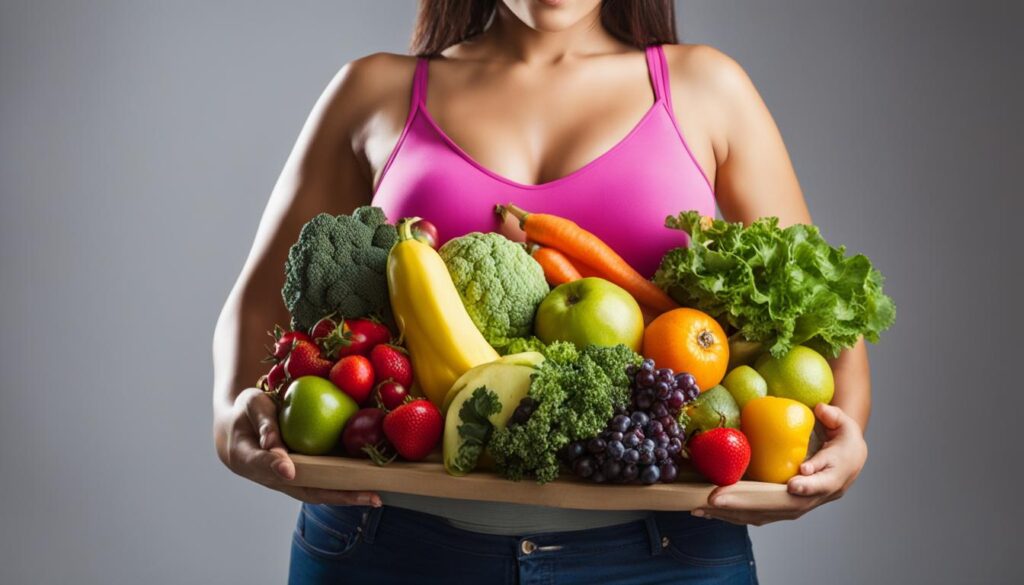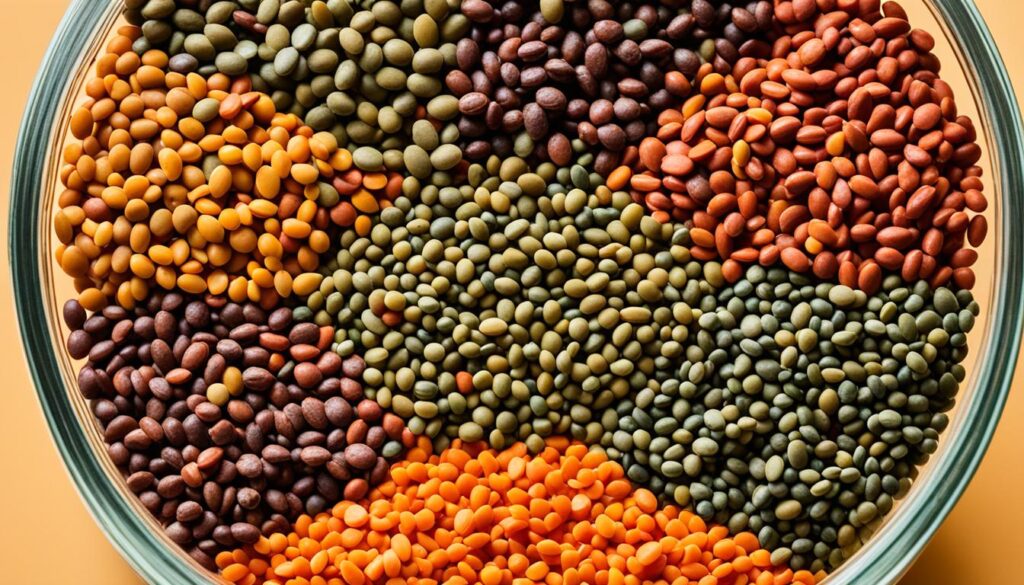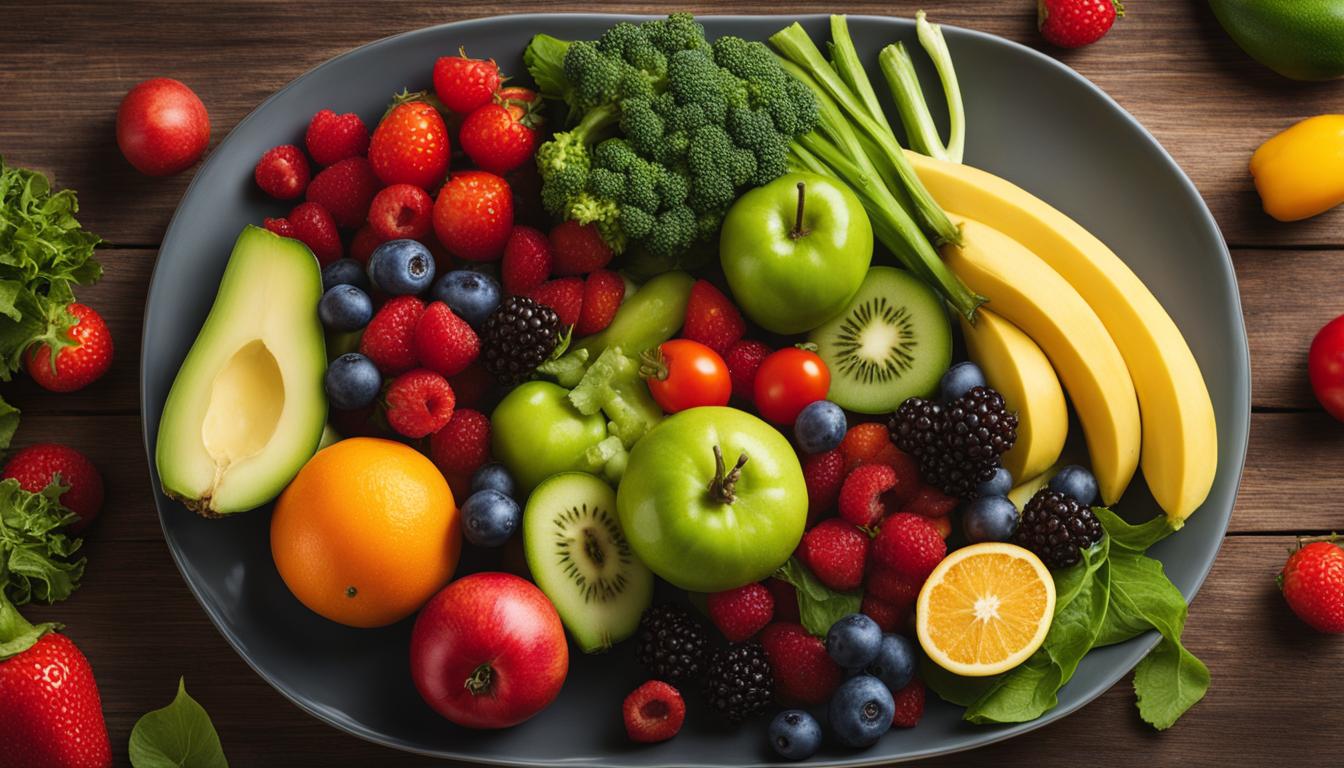Hey there! It’s time to tackle that stubborn belly bulge and say goodbye to it for good. If you’re tired of feeling bloated and struggling to lose weight, then the Anti-Bloat Diet is exactly what you need. This sustainable approach to weight loss focuses on making healthy food choices and incorporating specific foods into your diet that can help reduce bloating and boost your metabolism. Say goodbye to belly bulge and hello to a healthier, flatter stomach!
So, what exactly does the Anti-Bloat Diet involve? It’s all about making smart choices and avoiding certain foods that can contribute to bloating and weight gain. Say goodbye to alcohol, soda, and sugar, and hello to water-packed fruits and veggies, lentils, bananas, fennel, whole grains, yogurt, ginger tea, peppermint tea, chamomile tea, avocados, dark chocolate, and almonds. These foods not only help reduce bloating but also provide essential nutrients for a healthy, sustainable weight loss journey.
By following the Anti-Bloat Diet, you’ll be able to say goodbye to belly bulge in a way that is safe, healthy, and effective. No crash diets or extreme measures here. This diet is all about nourishing your body with the right foods and making lasting changes for a healthier lifestyle. No more feeling bloated or uncomfortable in your clothes. It’s time to look and feel your best!
Key Takeaways:
- The Anti-Bloat Diet is a sustainable approach to reducing belly bulge and promoting weight loss.
- By incorporating water-packed fruits and veggies, lentils, bananas, fennel, whole grains, yogurt, ginger tea, peppermint tea, chamomile tea, avocados, dark chocolate, and almonds, you can reduce bloating and achieve a flat stomach.
- Avoid alcohol, soda, and sugar, and prioritize healthy food choices.
- Stay hydrated and take care of your gut health for long-term success.
- Say goodbye to bloating and hello to a healthier, happier you!
Water-packed Fruits and Veggies
I’ve discovered that water-packed fruits and veggies are a game-changer when it comes to reducing bloating. Two of my top picks are cucumbers and papayas.
When it comes to cucumbers, they not only have a high water content, but they are also rich in flavonoid antioxidant quercetin. This combination makes them highly effective at preventing bloating.
As for papayas, they contain an enzyme called papain, which aids in the digestion of difficult-to-digest foods. This enzyme also helps reduce inflammation and belly bloat. Including these water-packed fruits and veggies in your diet can not only help you feel less bloated but also provide essential nutrients for weight loss.
Let’s take a closer look at the benefits of cucumbers and papayas:
| Cucumbers | Papayas |
|---|---|
| High water content | Aids digestion |
| Rich in quercetin | Reduces inflammation |
| Prevents bloating | Reduces belly bloat |
As you can see, both cucumbers and papayas have their unique benefits when it comes to reducing bloating and promoting a healthier, more comfortable belly. Including them in your diet is a simple and delicious way to support your weight loss goals.

Lentils and Other Pulses
When it comes to weight loss, incorporating lentils and other pulses into your diet can be incredibly beneficial. These legumes are not only packed with protein and fiber, but they also help increase satiety, keeping you full for longer periods and aiding in weight loss efforts. Lentils, in particular, are a great source of iron, which is essential for a healthy metabolism. By adding lentils to your meals, whether it’s in salads, as a replacement for whole grains like brown rice, or combined with lean proteins and veggies, you can reduce bloating and achieve sustainable weight loss.

Not only are lentils and other pulses nutritious, but they also offer a variety of culinary options. You can experiment with different lentil recipes, such as lentil soups, stews, or even lentil-based veggie burgers. The versatility of lentils allows you to incorporate them into your meals in creative ways, providing you with the necessary nutrients for weight loss while enjoying delicious and satisfying dishes.
Including lentils and other pulses in your diet not only helps with weight loss but also contributes to overall health. The fiber content aids in digestion, promotes a healthy gut, and prevents constipation. Additionally, the protein in lentils helps support muscle growth and repair, essential for maintaining a healthy body composition during weight loss journeys.
If you’re looking for a nutritious and filling addition to your meals that promotes weight loss, lentils and other pulses are an excellent choice. They provide a combination of protein, fiber, and important nutrients, contributing to satiety, reducing bloating, and helping you achieve your weight loss goals.
Bananas for Water Retention
Are you looking for a natural way to reduce water retention and bloating? Look no further than bananas! These delicious fruits are not only a tasty snack but also have numerous benefits for your digestive health.
One of the main reasons why bananas are effective in reducing water retention is their high potassium content. Potassium helps regulate the balance of fluids in your body and prevent excessive water retention. By including bananas in your diet, you can support a healthy fluid balance and minimize bloating.
In addition to potassium, bananas also contain resistant starch. This type of healthy carbohydrate resists digestion in the small intestine, reaching the large intestine intact. It acts as a prebiotic, providing nourishment for the beneficial bacteria in your gut. A healthy gut microbiome is essential for proper digestion and can help reduce bloating.
By consuming bananas regularly, you can enjoy the following benefits:
- Reduced water retention
- Improved digestion
- Support for a healthy gut microbiome
To incorporate bananas into your diet, you can enjoy them as a standalone snack, include them in smoothies or oatmeal, or use them as a natural sweetener in baked goods. With their versatility and nutritional benefits, bananas are a must-have fruit for reducing water retention and promoting a healthy digestive system.

Fennel for Improved Digestion
When it comes to improving digestion and reducing bloating, fennel has stood the test of time. This versatile herb has been used for centuries to relieve gastrointestinal spasms and promote overall digestive health. Whether consumed raw or cooked, fennel offers a natural remedy for treating bloating and enhancing the flavor of various dishes.
With its mild, licorice-like taste, fennel adds a unique flavor profile to both savory and sweet recipes. It can be sliced and added to salads for a refreshing crunch, or roasted with other vegetables to bring out its natural sweetness. Additionally, fennel seeds can be ground and used as a seasoning to impart a subtle hint of anise flavor to dishes.
But the benefits of fennel go beyond just enhancing taste. This herb contains compounds that have been found to stimulate digestion, improve nutrient absorption, and reduce gastrointestinal discomfort. Fennel can help alleviate symptoms of bloating, such as gas and abdominal pain, making it a valuable addition to any anti-bloat diet.
Furthermore, fennel is rich in vitamins and minerals, including vitamin C, potassium, and fiber. These nutrients support overall digestive health and contribute to a healthy gut microbiome. A healthy gut is essential for efficient digestion, nutrient absorption, and reducing the risk of bloating.
To incorporate fennel into your diet, consider trying these delicious and digestion-friendly recipes:
- Fennel Salad with Citrus Dressing: Combine thinly sliced fennel, orange segments, and arugula. Drizzle with a citrusy dressing made with lemon juice, olive oil, and a touch of honey.
- Roasted Fennel and Carrots: Toss fennel wedges and carrot sticks with olive oil, salt, and pepper. Roast in the oven until caramelized and tender.
- Fennel Tea: Steep fennel seeds in hot water for a soothing and digestive tea. You can add a touch of honey for natural sweetness.
Remember, fennel is not only a flavorful addition to your meals but also a natural aid in reducing bloating and improving digestion. By incorporating fennel into your anti-bloat diet, you can support a healthier belly and enjoy meals that are both delicious and nourishing.

Whole Grains for Regulating Blood Sugar
When it comes to maintaining stable blood sugar levels and preventing weight gain, incorporating whole grains into your diet is a smart choice. Whole grains, such as oats, quinoa, and brown rice, offer a host of benefits that can support your overall health and weight management goals.
One key advantage of whole grains is their high fiber content. Fiber plays an important role in regulating blood sugar levels by slowing down the absorption of carbohydrates. This helps prevent spikes and crashes in blood sugar, providing a steady and sustained release of energy throughout the day.
Moreover, fiber in whole grains promotes better digestion and increased satiety. When you consume whole grains, the fiber adds bulk to your meals, making you feel fuller for longer periods. This can help curb overeating and prevent weight gain.
Incorporating whole grains into your meals is easy and versatile. Start your day with a nutritious bowl of oatmeal topped with fresh berries or enjoy a colorful salad with quinoa for lunch. For dinner, swap out refined grains for nutrient-rich brown rice. By prioritizing whole grains, you can regulate your blood sugar levels, support weight management, and enjoy a variety of delicious and satisfying meals.
Benefits of Whole Grains for Regulating Blood Sugar:
- High fiber content aids in regulating blood sugar levels
- Slows down carbohydrate absorption, preventing blood sugar spikes
- Promotes better digestion and increased satiety
- Curbs overeating and supports weight management
- Easily incorporated into a variety of meals
Yogurt for Gut Health
When it comes to promoting gut health, yogurt, especially Greek yogurt, is a star player. Packed with beneficial probiotics, yogurt helps balance the gut flora, contributing to a healthier digestive system and reducing uncomfortable bloating.
Probiotics are live microorganisms that provide a wide range of health benefits, particularly for the gut. By introducing these friendly bacteria into your digestive system through yogurt consumption, you can improve digestion, enhance nutrient absorption, and strengthen your immune system.
Why Greek Yogurt?
Greek yogurt is an excellent choice for gut health due to its higher concentration of probiotics compared to regular yogurt. It undergoes a straining process that removes the whey, resulting in a thicker consistency and a richer probiotic content.
In addition to probiotics, Greek yogurt is also high in protein. This macronutrient plays a crucial role in increasing feelings of fullness and satiety, making it an ideal ingredient for weight management.
Incorporating Greek yogurt into your diet is easy and versatile. You can enjoy it on its own as a nutritious snack or use it as a base for smoothies, dips, dressings, or even as a substitute for mayonnaise in various recipes.
Pair your Greek yogurt with a handful of berries to add natural sweetness and an extra dose of antioxidants. This creamy and satisfying combination makes for a delicious and gut-friendly treat.
“Greek yogurt is my go-to choice for promoting gut health. Its probiotic-rich content and high protein make it a nutritious addition to my daily diet.”
– Nutrition Expert
Ginger Tea for Natural Remedy
When it comes to finding a natural remedy for bloating, ginger tea has been a trusted solution for centuries. This aromatic beverage contains compounds that aid in digestion, helping to move food through the digestive system and reduce instances of gas or indigestion. With its soothing properties, ginger tea can provide relief and alleviate discomfort caused by bloating.
Making ginger tea is simple and can be done with ground ginger or freshly grated ginger. Here’s a quick and easy recipe:
- Boil a cup of water.
- Add one teaspoon of ground ginger or one tablespoon of freshly grated ginger to a teapot or cup.
- Pour the boiling water over the ginger.
- Let it steep for 5-10 minutes.
- Strain the tea to remove any ginger particles.
- Sweeten with honey or lemon if desired.
Sip on a warm cup of ginger tea after meals or whenever you’re feeling bloated. It’s a gentle and effective way to support digestion and find relief from bloating naturally.
Try incorporating ginger tea into your daily routine to enjoy its numerous health benefits. Whether it’s reducing bloating, soothing an upset stomach, or simply enjoying its warm and comforting flavor, ginger tea is a natural remedy worth trying.
Peppermint and Chamomile Teas for Weight Loss
When it comes to shedding those extra pounds, incorporating herbal teas into your diet can be a beneficial and satisfying strategy. Two herbal teas that have gained popularity for their weight loss properties are peppermint tea and chamomile tea. Let’s explore how these teas can help you on your weight loss journey.
The Benefits of Peppermint Tea
In addition to its refreshing taste, peppermint tea offers several health benefits, including reducing bloating and aiding in weight loss. This soothing tea has natural antispasmodic properties that help relax the muscles in your digestive tract, promoting smoother digestion and reducing bloating.
The active compounds in peppermint, particularly the menthol, can also stimulate the breakdown of fat. This can increase your metabolic rate and promote the burning of calories, ultimately aiding in weight loss.
The Power of Chamomile Tea
Chamomile tea is well-known for its calming effects and is often consumed before bed to promote better sleep. But did you know that it can also support weight loss?
A lack of quality sleep can disrupt hormonal balance, leading to an increased appetite and a greater likelihood of weight gain. By improving sleep quality, chamomile tea indirectly helps regulate appetite and reduce the risk of belly fat accumulation.
How to Incorporate Peppermint and Chamomile Teas into Your Routine
Enjoying the weight loss benefits of peppermint and chamomile teas is as simple as brewing a cup! Here are some ideas for incorporating these teas into your daily routine:
- Sip on a cup of peppermint tea after meals to aid digestion and reduce bloating.
- Replace sugary beverages with chamomile tea to satisfy your cravings and promote better sleep.
- Create a soothing blend by combining peppermint and chamomile teas for a refreshing and calming beverage.
Remember, while peppermint and chamomile teas can be helpful in your weight loss journey, they should be complemented by a balanced diet and regular exercise for optimal results.
| Tea | Health Benefits |
|---|---|
| Peppermint Tea | Reduces bloating Promotes digestion Increases metabolic rate for weight loss |
| Chamomile Tea | Improves sleep quality Regulates appetite Reduces risk of belly fat accumulation |
Including peppermint and chamomile teas in your daily routine can be a delicious and effective way to support your weight loss goals. So why not sit back, relax, and enjoy a cup of these delightful teas while reaping their numerous health benefits?
Conclusion
The Anti-Bloat Diet offers a sustainable solution for reducing belly bulge and achieving long-term weight loss. By incorporating a variety of nutrient-rich foods into your diet, such as water-packed fruits and veggies, lentils, bananas, fennel, whole grains, yogurt, ginger tea, peppermint tea, chamomile tea, avocados, dark chocolate, and almonds, you can effectively say goodbye to bloating and hello to a flat stomach.
Making healthy food choices and staying hydrated are key factors in the success of the Anti-Bloat Diet. Choosing water-packed fruits and veggies, like cucumbers and papayas, can help reduce bloating and provide important nutrients for weight loss. Lentils and other pulses offer a good source of protein and fiber, keeping you fuller for longer and aiding digestion. Bananas help combat water retention, while fennel improves digestion and reduces bloating.
Additionally, incorporating whole grains into your meals helps regulate blood sugar levels and prevent weight gain. Yogurt promotes gut health with its probiotic content, and ginger tea acts as a natural remedy for bloating. Peppermint and chamomile teas have been linked to weight loss benefits. Remember to reduce sodium intake and indulge in healthy fats from avocados and dark chocolate. Finally, almonds provide appetite control and contribute to a healthier diet.
By following the Anti-Bloat Diet and focusing on holistic well-being, you can achieve sustainable weight loss and say goodbye to belly bulge. Prioritize your gut health, make informed food choices, and embark on the journey to a flatter tummy.
FAQ
What is the Anti-Bloat Diet?
The Anti-Bloat Diet is a sustainable approach to reducing belly bulge and promoting weight loss through healthy food choices and incorporating specific foods into your diet that can help reduce bloating and boost metabolism.
How can water-packed fruits and veggies help reduce bloating?
Water-packed fruits and veggies, such as cucumbers and papayas, are effective in preventing bloating. Cucumbers are rich in the flavonoid antioxidant quercetin and have a high water content. Papayas contain an enzyme called papain, which aids digestion, reduces inflammation, and belly bloat.
How do lentils and other pulses contribute to weight loss?
Lentils and other pulses, like chickpeas and white beans, are rich in protein and fiber, which increase satiety and keep you full for longer periods. They also provide important nutrients for weight loss and can help reduce bloating.
Can bananas help with water retention and bloating?
Absolutely! Bananas contain potassium and resistant starch, which regulate sodium levels in the body and prevent water retention. By including bananas in your diet, you can minimize belly bloat and reduce the risk of bloating.
How does fennel improve digestion and reduce bloating?
Fennel has been used for centuries to improve digestion, relieve GI spasms, and reduce bloating. It acts as a natural remedy by aiding digestion and enhancing flavor when added to various dishes.
What role do whole grains play in regulating blood sugar and weight gain?
Whole grains, like oats, quinoa, and brown rice, are high in fiber and help regulate blood sugar levels. They increase satiety, aid digestion, and can be incorporated into meals throughout the day to prevent weight gain and bloating.
How does yogurt contribute to gut health and reduce bloating?
Yogurt, especially Greek yogurt, contains probiotics that help balance the gut flora, promoting a healthy digestive system and reducing bloating. Greek yogurt is also high in protein, which boosts feelings of fullness.
Can ginger tea be used as a natural remedy for bloating?
Yes, ginger tea has been used for centuries to alleviate bloating. It contains compounds that aid digestion and reduce instances of gas or indigestion. Making ginger tea is an easy way to include it in your diet and alleviate bloating naturally.
Do peppermint and chamomile teas aid in weight loss?
Peppermint tea reduces bloating, making your stomach look flatter, while chamomile tea improves sleep, which has been linked to a decrease in belly fat. Including these herbal teas in your diet can aid in reducing bloating and supporting weight loss efforts.
What is the summary of the Anti-Bloat Diet?
The Anti-Bloat Diet is a sustainable approach to reducing belly bulge and promoting weight loss. By incorporating specific foods, avoiding certain ingredients, and making healthy food choices, you can say goodbye to bloating and achieve a flat stomach. Prioritizing gut health, drinking ginger tea, and including peppermint and chamomile teas in your diet can aid in reducing bloating and supporting weight loss efforts.

